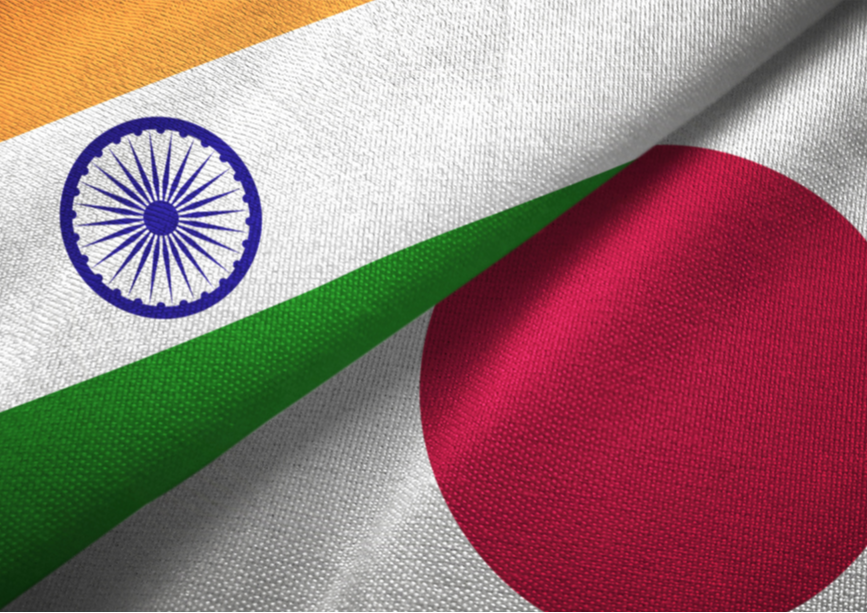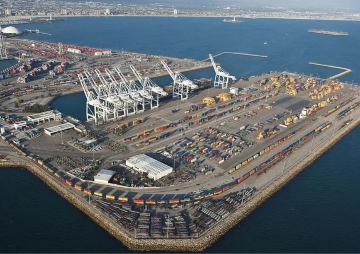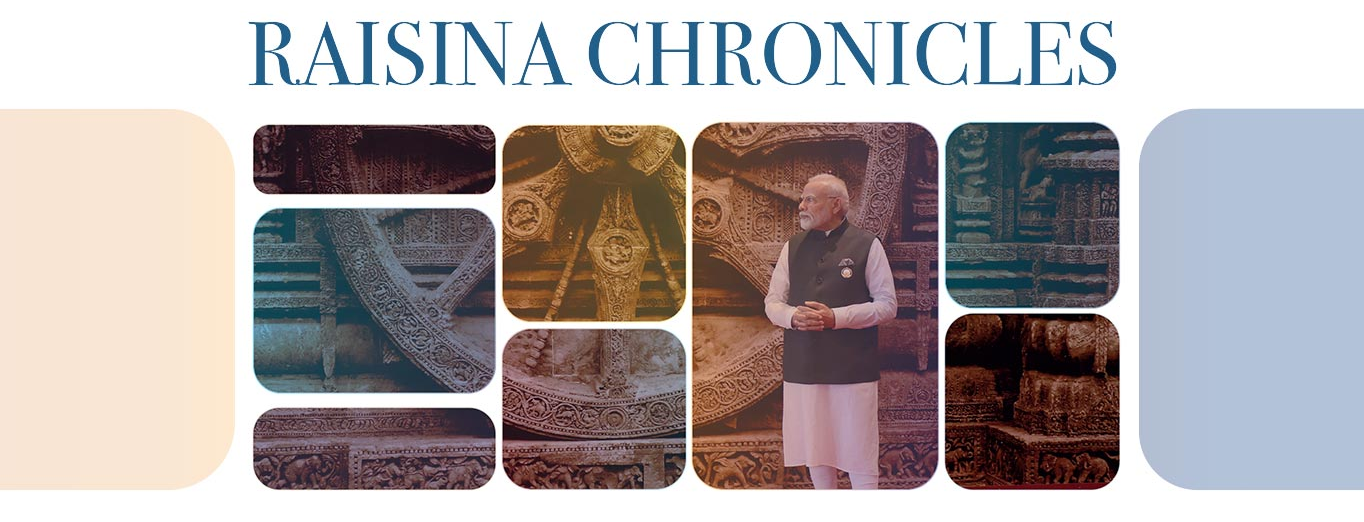
This article is a part of the series - Raisina Chronicles 2024
My first contact with ORF was when I presented a conference jointly organised by ORF and IISS in New Delhi. Thereafter, in 2020, the Japan Bank for International Cooperation (JBIC) began an engagement with ORF to strengthen its intelligence capabilities around South Asia. I was then invited to the Raisina Dialogue for the first time in 2021, held virtually during the COVID-19 pandemic, where I joined a panel with Tony Abbott, the former Australian prime minister. More importantly, I have a long relationship with India’s External Affairs Minister, S. Jaishankar, whose strong initiatives for the conference were a big reason for me to participate at the Raisina Dialogue.
My first in-person attendance at Raisina was in 2022, when I attended a panel discussion about investments in quality infrastructure. I also attended a Raisina fireside chat and was interviewed about Japanese economic statecraft. I was then invited to become an ORF Global Advisory Board Member, an offer I accepted without any hesitation.
I had also worked with IISS as a council member for global strategic events, including the Shangri-La Dialogue and the Manama Dialogue. While the Shangri-La Dialogue mainly focuses on defence security issues, the Raisina Dialogue covers a broader range of global topics, including advanced technology, environmental and social considerations, economic security, and economic statecraft. The unique, holistic agenda and the diverse and distinguished participants at the Raisina Dialogue are exceptional and impressive.
In 2023, I again visited Delhi for the 8th Raisina Dialogue. Having enjoyed a panel discussion with Prime Minister Abbott and Rajeev Chandrasekhar, India’s Minister of State for Electronics and Information Technology, I discussed with the ORF leadership an ambitious plan to hold Raisina@Tokyo in the near future.
Raisina@Tokyo Japan is now being planned by JBIC, ORF, and Keizai Doyukai (Japan Association of Corporate Executives), with leaders from India, Japan, and other like-minded countries invited to discuss strategic issues. I believe such a new initiative led by India and Japan will foster more strategic relationships and achieve new heights for relations between the two countries through its unique perspective and rich inspiration from Japan, which held the G7 presidency in 2023.
Please read the full volume here.
India’s Role
Now that the world is in the midst of a chaotic situation, India’s role in the global order is even more critical. Through the Raisina Dialogue, the global community can attain rich knowledge and information about ‘India Inc.,’ specifically its strategic intentions and willingness as a responsible regional and global power and a leader of the Global South.
Now that the world is in the midst of a chaotic situation, India’s role in the global order is even more critical. Through the Raisina Dialogue, the global community can attain rich knowledge and information about ‘India Inc.,’ specifically its strategic intentions and willingness as a responsible regional and global power and a leader of the Global South.
Economic security has been a priority for Japanese Prime Minister Fumio Kishida, as reflected by the creation of a new cabinet position dedicated to economic security in 2022, with Takayuki Kobayashi serving as its minister. The Kishida government then set up a promotion council to draft legislation outlining economic security goals. Finally, it appointed a private sector advisory group to help refine those goals and to prioritise government planning. Keizai Doyukai also weighed in, urging the government to remain in close contact with private actors that it could oversee as it sought to enhance economic security. I was appointed chairperson of the Global South India Committee, newly established in Keizai Doyukai, and I am keen to play a leading role in fostering an understanding among key Japanese players of the recent business environment and opportunities and issues in India.
While the world is yet to recover from the COVID-19 pandemic, and global real GDP is forecast to grow by only 2.2 percent in 2023, India has overtaken the UK to become the world’s fifth-largest economy. It achieved a strong recovery, with 7.2 percent growth in 2022-23, and is now targeting continuous 6 percent growth in FY 2023-24. India’s emerging consumer market and its huge industrial potential for global supply chains have made it an increasingly important investment destination for multinationals in diverse sectors, such as information technology, electronics, pharmaceuticals, and renewables.
While the world is yet to recover from the COVID-19 pandemic, and global real GDP is forecast to grow by only 2.2 percent in 2023, India has overtaken the UK to become the world’s fifth-largest economy.
As Japan took up the mantle of the leadership of the G7, and being the only Asian member of the G7, Japan’s presidency had worked more intently with a rising India, which had the presidency of G20. It was in Japan’s interests to utilise its G7 presidency to strengthen its relationship with India and synergise a cooperative framework. India also held a virtual summit with leaders of African and Asian countries, aptly called the Voice of the Global South, to hear their problems, enabling it to present them at the G20 Summit. Eventually, as India and Japan have successfully presided over the G7 and G20, they will collaborate in the future to synergise their efforts to combat pressing global challenges.
India and Japan share strong economic ties, and trade between the two was worth US$20.57 billion in FY2021-22. Our two countries have surpassed their previous target of JPY 3.5 trillion in Japanese investment between 2014-2019 and have set an investment target of US$42 billion from Japan to India in the next five years, which was announced after the 14th annual summit held in 2022.
India and Japan share a similar outlook on regional security, economic growth, and strategic interests. In recent years, the relationship has evolved into a strategic partnership, with both nations collaborating on various fronts, including defence, security, trade, investments, and technology. In the current geopolitical scenario, the Indo-Pacific region has emerged as a focal point of global attention, and India and Japan are at the forefront of efforts to maintain stability in the region.
Japan’s free and open Indo-Pacific strategy and India’s Indo-Pacific Oceans Initiative have provided the framework for the two countries to deepen their strategic partnership and cooperation in the region. With the upscaling of the Quad between the US, Australia and our two countries, India and Japan’s growing ties in the Indo-Pacific are grounded in a shared commitment to multilateralism and strengthening of rules-based order.
Japan’s free and open Indo-Pacific strategy and India’s Indo-Pacific Oceans Initiative have provided the framework for the two countries to deepen their strategic partnership and cooperation in the region.
Another critical aspect in the ‘Japan and India Vision 2025,’1 which seeks synergy between India’s ‘Act East’ policy and Japan’s ‘Partnership for Quality Infrastructure,’ is the intention expressed by the two nations to promote quality infrastructure to augment connectivity in the region.
In March, 2023, Japan first unveiled its vision for a ‘Bay of Bengal-Northeast India industrial value chain concept’ during a key policy speech delivered by Prime Minister Kishida in New Delhi.
Under this concept, Japan will view Bangladesh and other areas of the South as an integrated single economic zone and will promote the Bay of Bengal-Northeast India industrial value chain concept in cooperation with India and Bangladesh. To foster growth in the entire region, Japan will encourage business leaders to take a “fresh look at India’s northeast, to fully harness its potential.”2 Japan is looking ahead to collaborate closely with India and contribute to stability in the South Asian region.
JBIC’s Actions in India
Since 2020, JBIC has mobilised US$13 billion for India together with our co-financial partners. Addressing the dynamic global environment, JBIC has been leveraging the strengths of Japanese companies and aligning its operations based on the global priorities of host countries. India has undertaken several reforms to revitalise investment in the manufacturing sector, such as the ease of doing business, demystifying labour and tax laws, and strengthening insolvency and bankruptcy laws. Bolstered by these reforms, Japan’s Nippon Steel Corporation, in partnership with ArcelorMittal S.A. of Luxembourg, acquired distressed Essar Steel Limited at an insolvency and bankruptcy proceeding. To support this merger and acquisition and the Make in India initiative, in March 2020, JBIC mobilised financing of US$5,000 million to revitalise and expand the renamed ArcelorMittal Nippon Steel India Limited. Subsequently, in March 2023, JBIC further mobilised another US$5,000 million to finance investment in capacity expansion of an integrated steel facility from 9 mtpa to 15 mtpa in Hazira, Gujarat, to meet the growing steel demand in India.
Amid the raging COVID-19 pandemic, the first Quad Leadership Summit was held in March 2021, where the leaders of Japan, Australia, India, and the US identified the response to the pandemic as the most urgent global challenge. In this context, being a policy lending financial institution, JBIC committed US$100 million to the Export Import Bank of India to enhance investments in the healthcare sector related to COVID-19, including vaccines and treatment drugs.
The COVID-19 pandemic cracked wide open the fractured global supply chains, which forced the industrial sector to review and optimise the global supply chain, which was facing growing geopolitical risks and uncertainties. In 2020, when economic activities were stagnating due to pandemic restrictions, the Indian government proactively announced several economic measures to sustain liquidity and stimulate manufacturing. To supplement these measures and strengthen the resilience of the supply chains of Japanese automobile manufacturers in India, JBIC extended a total of US$2,000 million to State Bank of India in October 2020 and March 2021 to promote the smooth flow of funds for the manufacturing and sales businesses of suppliers and dealers of Japanese automobile manufacturers, as well as for the provision of auto loans for the purchase of Japanese automobiles.
Consequently, similar support of US$100 million was established with IndusInd Bank in March 2023 to enhance the supply chain resilience of Japanese construction equipment manufacturers in India, which was necessary for expanding the development of India’s infrastructure and the strengthening of local small- and medium-sized suppliers, dealers, contractors, and others.
JBIC is also at the forefront of leading Japanese companies’ initiatives to address global challenges, especially concerning the transition towards a decarbonised society. In India, JBIC has been supporting energy transition initiatives of public and private sector companies using advanced Japanese technologies. In October 2020, JBIC extended a loan of JPY 50 billion to NTPC Limited to diversify its generation mix by adding solar power generation projects and addressing elevated air pollution by supporting the installation of environmental equipment projects. JBIC also partnered with Power Finance Corporation by setting up a JPY 30 billion line of credit to support renewable energy projects and energy-efficient power generation projects in India. Additional support of JPY 15 billion was extended to SJVN Limited in March 2023 for its solar power generation projects in India.
Finally, JBIC promotes equity investment as a multifunctional development financial institution. India and Japan have been undertaking multiple initiatives, including the India-Japan Clean Energy Partnership, to promote environmental preservation efforts in India, and in August 2023, JBIC and India’s National Infrastructure Investment Fund established a bilateral India-Japan Fund under the India-Japan Clean and Growth Platform. The fund will enable the injection of equity investment in ambitious and promising projects with a Japan nexus in clean and growth-oriented sectors across India.
The views expressed above belong to the author(s). ORF research and analyses now available on Telegram! Click here to access our curated content — blogs, longforms and interviews.




 PREV
PREV



